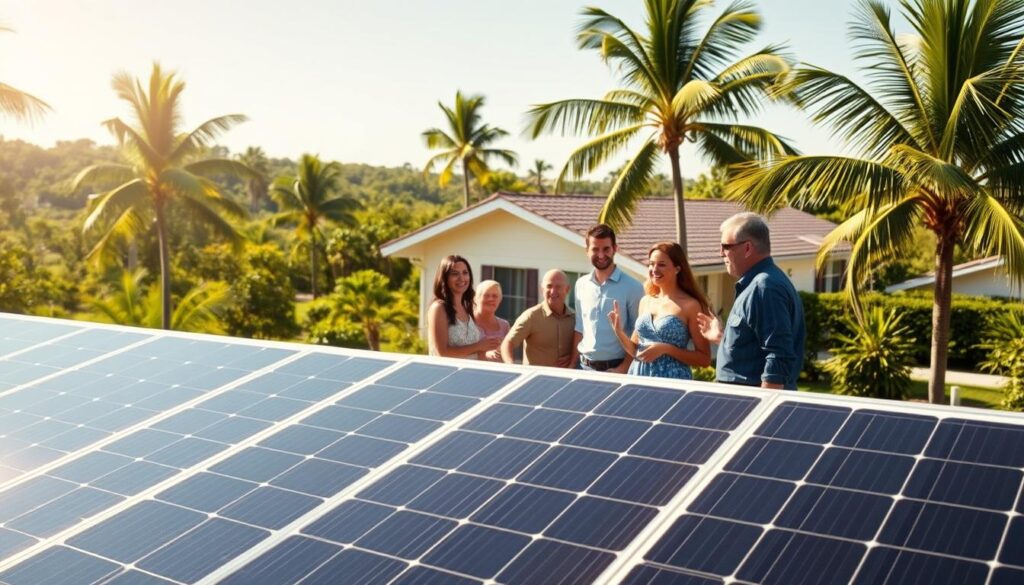Florida homeowners can slash energy costs and boost savings with top-tier solar panel florida rebates and solar incentives in Florida. Programs like the 30% federal tax credit and full retail net metering payments from utilities like Florida Power & Light make solar more accessible. Imagine cutting your monthly electric bill by thousands or even reaching zero bills with a large system. Key programs like the Solar Investment Tax Credit and property tax exemptions also protect budgets while rewarding eco-friendly choices.
Key Takeaways
- Florida’s federal Solar ITC reduces costs by 30%, saving homeowners up to $19,656 on a 9kW system.
- Property tax exemptions prevent tax hikes while adding home value, saving an extra $250 yearly.
- Net metering pays full retail rates for excess energy, lowering or eliminating electric bills.
- The EcoFlow DELTA Pro 3 Solar Generator offers 4,000W output, expanding energy independence.
- Average payback periods hit 10 years, with lifetime savings topping $31,000.
From sales tax exemptions to low-interest PACE loans, this guide breaks down how to maximize every solar opportunity in the Sunshine State. Let’s dive into how these programs turn solar from a cost into a smart investment.
Introduction to Solar Panel Rebates in Florida
Florida’s solar energy rebates Florida and rebate programs make it easier than ever to switch to clean energy. These incentives cut costs, making solar panels affordable for homeowners. With the right programs, residents can save thousands while helping the environment.
Understanding Solar Rebates
Rebates directly reduce system costs, unlike tax credits. Florida’s solar rebate programs include the 30% federal tax credit and sales tax exemptions. For example, a $20,000 system saves $1,200 in sales tax. While Florida Power and Light offers no rebates in 2024, other incentives remain strong.
- Federal Solar Investment Tax Credit (ITC): 30% of system cost)
- Sales tax exemption saves up to $1,200
- No state income tax credits but property tax exemptions apply
Importance of Going Solar
Switching to solar cuts energy bills by $1,000–$2,000 yearly. Solar systems also boost home values by an average of 4.1%. Plus, they reduce carbon emissions, aligning with Florida’s goal to cut greenhouse gases 30% by 2030.
| Annual Energy Savings | Payback Period | Environmental Impact |
|---|---|---|
| $1,000–$2,000 | 5–7 years | Reduces CO₂ by 3-5 tons/year |
Overview of Florida’s Solar Landscape
Florida ranks third nationally in solar capacity, with 6,000+ megawatts installed. Despite its sunny climate, adoption lagged until recently. Now, 2023 saw 28% growth—the fastest in the US. By 2024, floating solar systems will expand options for waterfront homes.
| Year | Installed Capacity | Growth Rate |
|---|---|---|
| 2022 | 5,000 MW | 45% increase |
| 2023 | 6,000 MW | 28% growth |
Florida’s solar rebates programs and incentives are driving this surge. With federal and local support, now is the time to act.
Types of Rebates Available in Florida
Going solar in Florida means accessing multiple rebate programs designed to cut costs. Tax incentives for solar panels in Florida include state exemptions, federal credits, and utility rewards. These programs simplify the switch to renewable energy, making it easier to afford clean power.

State and Local Incentives
Florida’s policies shield homeowners from added expenses. The Florida solar panel tax credit ensures solar systems won’t raise property taxes. Purchasing equipment? Skip the 6% sales tax on items like panels and batteries. These exemptions save thousands upfront, leaving more money for installation costs.
Federal Solar Investment Tax Credit (ITC)
Qualify for a 30% federal tax credit on system costs. For a typical 5kW system priced at $10,548, this credit lowers expenses by $3,164. The Inflation Reduction Act extends this benefit through 2032, locking in savings for homeowners.
Utility-Specific Rebates
- Utilities like Florida Power & Light (FPL), Duke Energy, and Tampa Electric (TECO) offer net metering. Excess energy earns credits valued at retail rates.
- Many utilities provide 1:1 credit ratios, letting homeowners apply excess energy savings to future bills over 12 months.
Check local providers for extra rebates—some cooperatives add regional discounts.
How to Qualify for Solar Rebates in Florida
Securing state rebates for solar panels in Florida starts with meeting basic requirements. Programs like the solar panel florida rebates initiatives often require proof of ownership, system specifications, and compliance with local codes. Here’s how to prepare:
Eligibility Requirements
Check these criteria before applying:
- Residential or commercial property ownership
- System size limits (varies by program)
- Installation timeline requirements
- Residency for state tax exemptions
Necessary Documentation
Collect these items to submit with applications:
- Purchase and installation receipts
- Manufacturer certifications for panels
- Property tax records
- Building permits
Installation Standards
Systems must be:
- Installed by Florida-licensed contractors
- Comply with Florida Building Code, including hurricane-resistant mounting
- Registered with local utilities
| Program | Max Rebate | Eligibility |
|---|---|---|
| Dunedin Solar Grant | $2,500 | Residential systems ≥5kW |
| Florida Keys Loan | $35,000 | Grid-tied DER systems |
| Fort Pierce Rebate | $450 | Solar water heaters |
Steps to Apply for Solar Rebates

Claiming solar incentives in Florida starts with smart planning. Begin by connecting with installers certified in Florida solar energy incentive programs. These professionals guide you through every step, ensuring you meet all requirements efficiently.
Finding Approved Installers
- Verify licenses via the Florida solar energy incentive programs directory
- Check NABCEP certification for installers
- Compare quotes from companies like Boynton Beach Energy Edge and Florida Keys Electric Cooperative
Application Process Overview
- Secure a written quote for your system (e.g., $25,200 for an 8.4kW array)
- Submit paperwork for rebates like the $1,500 Boynton Beach incentive
- File federal ITC claims using IRS Form 5695
- Track utility rebates (e.g., Jacksonville JEA’s $4,000 battery incentive)
Timelines for Rebate Approval
Sales tax exemptions take effect immediately upon purchase. Federal tax credits require IRS processing (up to 8 weeks). Utility rebates average 4–6 weeks. Track deadlines for programs like Dunedin’s $2,500 grant to avoid missing opportunities.
PACE loans and net metering claims can be processed in 30 days. Stay organized with digital copies of W-9 forms and system invoices to speed approvals.
The Role of the Florida Solar Energy Center
The Florida Solar Energy Center (FSEC) drives innovation and education to boost solar adoption in the Sunshine State. This research hub, part of the University of Central Florida, ensures solar tech meets Florida’s unique needs—like hurricane resistance and high humidity. Their work directly supports efforts to maximize solar power rebates in Florida by improving system efficiency and safety standards.
Research and Development Contributions
FSEC tests solar panels to withstand Florida’s harsh conditions. Their studies on photovoltaic durability have helped double the lifespan of systems, reducing long-term costs. Key achievements include:
- Developing hurricane-proof mounting systems to qualify for solar energy rebates Florida programs.
- Advancing humidity-resistant coatings, cutting maintenance needs by 40%.
- Partnering with utilities like FPL to standardize rebate-eligible equipment.
Educational Resources for Consumers
FSEC offers free guides and calculators to help residents claim rebates incentives. Resources include:
- Interactive tools estimating rebates based on location and system size.
- Workshops explaining how solar energy rebates Florida reduce installation costs.
- Publications comparing state and utility-specific rebate rules.
By bridging technical research and public knowledge, FSEC empowers homeowners to navigate solar power rebates in Florida confidently. Their data-backed advice ensures systems meet rebate criteria while maximizing energy savings.
Financial Benefits of Solar Panel Installation
Switching to solar in Florida means more cash in your pocket and a brighter financial future. solar panel florida rebates and the Florida solar panel tax credit cut costs upfront, while long-term savings keep growing. Here’s how:

Long-Term Savings on Electricity Bills
Florida’s sunny climate accelerates savings. Net metering turns unused energy into credits, slashing monthly bills. Homeowners save an average of $250 yearly, with total savings reaching thousands over a panel’s 25+ year lifespan.
- Annual savings: Up to $3,000 over 10 years
- Net metering credits = free energy storage
Increased Property Value
Zillow reports solar installations boost home value by 4% immediately. Over 25 years, University of Michigan research shows values could jump 19%. Buyers pay premiums for energy-efficient homes, making solar a top resale asset.
| Factor | Impact |
|---|---|
| Instant value gain | 4% (Zillow) |
| Long-term appreciation | Up to 19% (25-year study) |
Tax Advantages
Florida’s Florida solar panel tax credit removes sales tax on solar systems, saving 6% upfront. The federal Investment Tax Credit (ITC) covers 30% of system costs until 2032, then phases to 26% (2023) and 22% (2024). Property taxes stay low too: solar systems don’t raise assessed values.
- 2022-2032: 30% federal ITC
- No sales tax on solar equipment
- No property tax hikes for solar upgrades
With these incentives, solar pays for itself faster—and keeps paying back for decades.
Popular Solar Panel Programs in Florida
Florida offers a variety of Florida solar energy incentive programs designed to make solar adoption accessible. From community-based options to flexible financing, these initiatives simplify transitioning to renewable energy.
Community Solar Programs
Residents without suitable roofs can join solar incentives in Florida like community solar. Programs such as Dunedin’s Solar Energy Grant Program provide up to $2,500 in rebates for installations over 5kW. These shared systems let participants benefit through subscription models, ensuring broad participation.
Property Assessed Clean Energy (PACE) Financing
PACE financing lets homeowners fund solar projects through property tax assessments. Loans extend up to 25 years with no upfront costs, secured by home equity. Eligibility requires 10% home equity and up-to date property tax payments. Programs like SELF offer loans starting at $1,000 with rates from 5%–9.5%, providing long-term flexibility.
Net Metering Policies
Florida’s net metering policies reward excess energy production. Utilities like FPL credit full retail rates for surplus power, boosting savings. This policy contributed to Florida’s 28% annual solar growth in 2023. Homeowners retain credits for future use, enhancing long-term value.
Exploring these programs helps residents choose options that align with their needs. From shared solar to extended loans, Florida’s Florida solar energy incentive programs make clean energy attainable for all.
Common Misconceptions About Solar Energy
Florida’s sunny climate makes solar energy ideal, yet myths about cost, upkeep, and environmental impact still confuse many homeowners. Let’s set the record straight with facts that highlight solar’s real benefits.
Debunking Myths About Costs
High upfront costs are a common barrier, but solar power rebates in Florida and federal incentives slash expenses. For instance, the 30% federal tax credit cuts a $20,000 system to $14,000. Add state rebates and sales tax exemptions, and the net cost drops further. Florida’s programs like solar energy rebates Florida also reduce expenses, making solar affordable for many. Modern installers even offer systems 30% cheaper than average prices, thanks to streamlined processes.
Understanding Maintenance Requirements
Solar panels need little upkeep. Built to handle Florida’s humidity and storms, they rarely require repairs. Cleaning once or twice yearly keeps them efficient. Most damage comes from debris, but automated sprinklers or rain often do the job. Warranties cover defects, so homeowners enjoy peace of mind without daily maintenance.
Environmental Impact Clarification
Solar reduces carbon emissions more in Florida than in states with cleaner grids. The National Renewable Energy Laboratory (NREL) shows solar could supply 33% of Florida’s energy, cutting fossil fuel use. Even on cloudy days, panels generate power, lowering reliance on coal or gas plants. Every kilowatt-hour produced shrinks the state’s carbon footprint, accelerating progress toward sustainable energy.
Future of Solar Energy in Florida
Florida’s solar energy landscape is evolving rapidly. With a 28% yearly growth in solar capacity and a national ranking of third, the Sunshine State is a solar hotspot. As new technologies and policies emerge, homeowners and businesses can position themselves for long-term savings through programs like Florida solar rebate programs and state rebates for solar panels in Florida
Trends in Solar Adoption
- Florida Power & Light (FPL) aims for 4,000 MW of energy storage by 2033, up from 520 MW today.
- Projects like the 300 MW Bighorn Solar and 150 MW Comanche Solar are expanding grid capacity, powering over 90,000 homes combined.
- Nationwide, Florida ranks third in solar capacity, driven by year-round sunshine and 30% federal tax credits (available until 2032).
Legislative Changes on the Horizon
Net metering laws remain stable after 2021-2022 vetoes, but proposed changes could alter how excess energy credits are calculated. While Florida lacks a renewable portfolio standard, state rebates for solar panels in Florida continue encouraging adoption. Watch for 2024 legislative sessions to address tax incentives and utility policies.
Innovations in Solar Technology
Florida’s climate demands resilient tech. New hurricane-resistant panels and inverters reduce storm damage risks. High-efficiency panels optimized for extreme heat boost energy output. FPL’s energy storage expansion supports grid reliability, enabling solar owners to store surplus power during outages.
Conclusion: Making the Most of Solar Panel Rebates
Solar energy in Florida offers unmatched savings through tax incentives for solar panels in Florida and Florida solar energy incentive programs. With rebates, tax credits, and net metering, homeowners can slash energy bills and boost home value. Let’s review how to maximize these opportunities and take the next steps.
Recap of Key Points
Florida’s solar programs include the 30% Federal Investment Tax Credit (ITC), state rebates like Boynton Beach’s $1,500 offer, and net metering policies. These programs reduce upfront costs and monthly bills. Over 25 years, a $15,000 system could save $69,511—far outweighing initial expenses. The state’s sales tax exemption further lowers costs, while net metering credits offset utility bills.
Encouragement to Take Action
Act now to secure the current 30% ITC before it drops to 26% in 2023. Compare quotes from certified installers, check local rebates, and explore PACE loans or solar loans. With rising grid costs up 18% in two years, delaying could mean missing out on long-term savings. Start by contacting approved installers and review utility rebate details.
Resources for Further Information
Visit the Florida Solar Energy Center for guides and calculators. DSIRE tracks local and federal incentives, while SEIA provides state-specific tools. The FSEC website also explains net metering details. Explore these resources to find the best fit for your home’s energy needs and budget.
